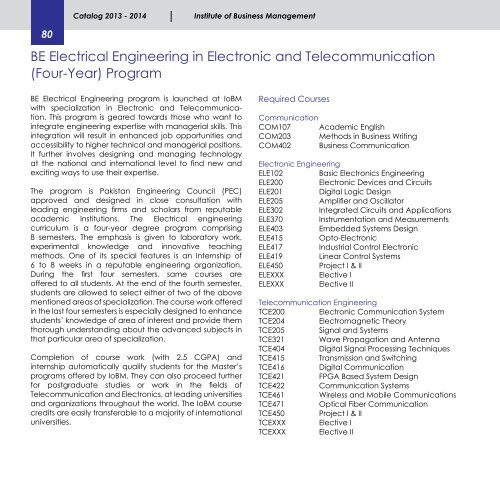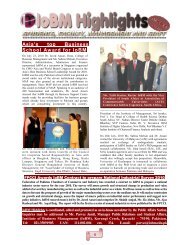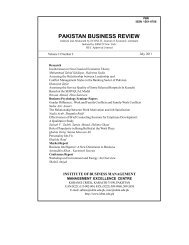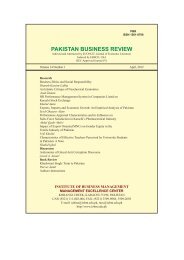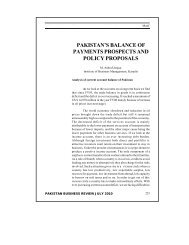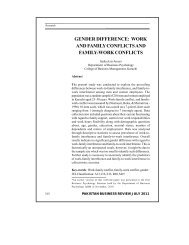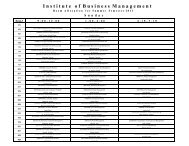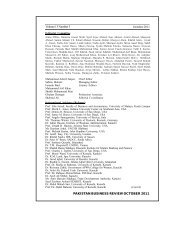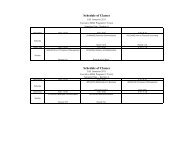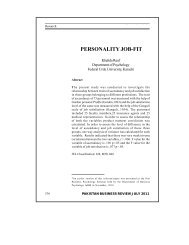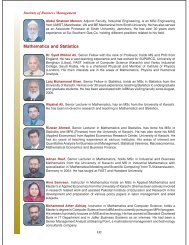(Four-Year) Program - Institute of Business Management
(Four-Year) Program - Institute of Business Management
(Four-Year) Program - Institute of Business Management
You also want an ePaper? Increase the reach of your titles
YUMPU automatically turns print PDFs into web optimized ePapers that Google loves.
Catalog 2013 - 2014<br />
<strong>Institute</strong> <strong>of</strong> <strong>Business</strong> <strong>Management</strong><br />
80<br />
BE Electrical Engineering in Electronic and Telecommunication<br />
(<strong>Four</strong>-<strong>Year</strong>) <strong>Program</strong><br />
BE Electrical Engineering program is launched at IoBM<br />
with specialization in Electronic and Telecommunication.<br />
This program is geared towards those who want to<br />
integrate engineering expertise with managerial skills. This<br />
integration will result in enhanced job opportunities and<br />
accessibility to higher technical and managerial positions.<br />
It further involves designing and managing technology<br />
at the national and international level to find new and<br />
exciting ways to use their expertise.<br />
The program is Pakistan Engineering Council (PEC)<br />
approved and designed in close consultation with<br />
leading engineering firms and scholars from reputable<br />
academic Institutions. The Electrical engineering<br />
curriculum is a four-year degree program comprising<br />
8 semesters. The emphasis is given to laboratory work,<br />
experimental knowledge and innovative teaching<br />
methods. One <strong>of</strong> its special features is an Internship <strong>of</strong><br />
6 to 8 weeks in a reputable engineering organization.<br />
During the first four semesters, same courses are<br />
<strong>of</strong>fered to all students. At the end <strong>of</strong> the fourth semester,<br />
students are allowed to select either <strong>of</strong> two <strong>of</strong> the above<br />
mentioned areas <strong>of</strong> specialization. The course work <strong>of</strong>fered<br />
in the last four semesters is especially designed to enhance<br />
students’ knowledge <strong>of</strong> area <strong>of</strong> interest and provide them<br />
thorough understanding about the advanced subjects in<br />
that particular area <strong>of</strong> specialization.<br />
Completion <strong>of</strong> course work (with 2.5 CGPA) and<br />
internship automatically qualify students for the Master’s<br />
programs <strong>of</strong>fered by IoBM. They can also proceed further<br />
for postgraduate studies or work in the fields <strong>of</strong><br />
Telecommunication and Electronics, at leading universities<br />
and organizations throughout the world. The IoBM course<br />
credits are easily transferable to a majority <strong>of</strong> international<br />
universities.<br />
Required Courses<br />
Communication<br />
COM107 Academic English<br />
COM203 Methods in <strong>Business</strong> Writing<br />
COM402 <strong>Business</strong> Communication<br />
Electronic Engineering<br />
ELE102 Basic Electronics Engineering<br />
ELE200 Electronic Devices and Circuits<br />
ELE201 Digital Logic Design<br />
ELE205 Amplifier and Oscillator<br />
ELE302 Integrated Circuits and Applications<br />
ELE370 Instrumentation and Measurements<br />
ELE403 Embedded Systems Design<br />
ELE415 Opto-Electronic<br />
ELE417 Industrial Control Electronic<br />
ELE419 Linear Control Systems<br />
ELE450 Project I & II<br />
ELEXXX Elective I<br />
ELEXXX Elective II<br />
Telecommunication Engineering<br />
TCE200 Electronic Communication System<br />
TCE204 Electromagnetic Theory<br />
TCE205 Signal and Systems<br />
TCE321 Wave Propagation and Antenna<br />
TCE404 Digital Signal Processing Techniques<br />
TCE415 Transmission and Switching<br />
TCE416 Digital Communication<br />
TCE421 FPGA Based System Design<br />
TCE422 Communication Systems<br />
TCE461 Wireless and Mobile Communications<br />
TCE471 Optical Fiber Communication<br />
TCE450 Project I & II<br />
TCEXXX Elective I<br />
TCEXXX Elective II
Catalog 2013 - 2014<br />
<strong>Institute</strong> <strong>of</strong> <strong>Business</strong> <strong>Management</strong><br />
81<br />
Computer Engineering<br />
CME102 Fundamentals <strong>of</strong> Computing<br />
CME104 Computer Prog. and Problem Solving<br />
CME200 Computer Aided Engineering Design<br />
CME201 Microprocessor Systems<br />
CME202 Data Communication and Computer<br />
Networks<br />
Electrical Power Engineering<br />
EPE101 Linear Circuit Analysis<br />
EPE102 Electrical Workshop Practices<br />
EPE200 Network Analysis<br />
EPE302 Electrical Machines<br />
Engineering <strong>Management</strong><br />
ENG203 Engineering Economics<br />
General Sciences<br />
GSC103 Applied Physics<br />
<strong>Management</strong><br />
MAN101<br />
Mathematics<br />
MTH107<br />
MTH204<br />
MTH215<br />
MTH216<br />
MTH403<br />
Principles <strong>of</strong> <strong>Management</strong><br />
Calculus and Analytical Geometry<br />
Linear Algebra<br />
Differential Equation<br />
Complex Variable and Transforms<br />
Numerical Computing and Analysis<br />
Political Sciences<br />
PSC301 Pakistan Studies<br />
Psychology<br />
PSY400<br />
Religious Studies<br />
REL101 Islamic Studies<br />
Social Sciences<br />
SSC203<br />
Statistics<br />
STA203<br />
Intro. to Organizational Psychology<br />
Ethical Behavior<br />
Probability Theory and Statistics<br />
Course Structure<br />
First two years are common for both electrical engineering<br />
streamlines (Electronic and Telecommunications)<br />
Semester One<br />
Academic English (3+0)<br />
Applied Physics (3+1)<br />
Linear Circuit Analysis (3+1)<br />
Fundamentals <strong>of</strong> Computing (3+1)<br />
Calculus and Analytical Geometry (3+0)<br />
Semester Two<br />
Methods in <strong>Business</strong> Writing (3+0)<br />
Basic Electronics Engineering (3+1)<br />
Differential Equations (3+0)<br />
Computer <strong>Program</strong>ming and Problem Solving (3+1)<br />
Islamic Studies or Ethical Behavior (2+0)<br />
Electrical Workshop Practices (0+1)<br />
Semester Three<br />
Electronic Devices and Circuits (3+1)<br />
Digital Logic Design (3+1)<br />
Network Analysis (3+1)<br />
Linear Algebra (3+0)<br />
Pakistan Studies (2+0)<br />
Computer Aided Engineering Design (0+1)<br />
Semester <strong>Four</strong><br />
Microprocessor Systems (3+1)<br />
Data Communication and Computer Networks (3+1)<br />
Electromagnetic Theory (3+0)<br />
Complex Variables and Transforms (3+0)<br />
Signal and Systems (3+1)<br />
Course Structure<br />
Streamline1: Electronic Engineering<br />
Semester Five<br />
Probability Theory and Statistics (3+0)<br />
Principles <strong>of</strong> <strong>Management</strong> (3+0)<br />
Amplifier and Oscillator (3+1)<br />
Linear Control Systems (3+1)<br />
Electrical Machine (3+1)
Catalog 2013 - 2014<br />
<strong>Institute</strong> <strong>of</strong> <strong>Business</strong> <strong>Management</strong><br />
82<br />
Semester Six<br />
Instrumentation and Measurements (3+1)<br />
Electronic Communication Systems (3+1)<br />
Engineering Economics (3+0)<br />
Digital Signal Processing (3+1)<br />
Integrated Circuits and Applications (3+1)<br />
Semester Seven<br />
Introduction to Organization Psychology (2+0)<br />
Industrial Control Electronic (3+1)<br />
Embedded Systems Design (3+1)<br />
Elective I (3+0)<br />
Project I (0+3)<br />
Semester Eight<br />
<strong>Business</strong> Communication (2+0)<br />
Opto-Electronic (3+1)<br />
FPGA Based System Design (3+1)<br />
Elective II (3+0)<br />
Project II (0+3)<br />
Elective Courses<br />
Streamline1: Electronic Engineering<br />
Semester Six<br />
Wave Propagation and Antenna (3+1)<br />
Principles <strong>of</strong> <strong>Management</strong> (3+0)<br />
Linear Control Systems (3+1)<br />
Engineering Economics (3+0)<br />
Digital Communication (3+1)<br />
Semester Seven<br />
Introduction to Organizational Psychology (2+0)<br />
Digital Signal Processing Techniques (3+1)<br />
Wireless and Mobile Communication (3+0)<br />
Elective I (3+0)<br />
Project I (0+3)<br />
Semester Eight<br />
<strong>Business</strong> Communication (2+0)<br />
Optical Fiber Communication (3+1)<br />
Communication System (3+0)<br />
Elective II (3+0)<br />
Project II (0+3)<br />
Elective Courses<br />
Streamline2: Telecommunication Engineering<br />
CME414<br />
ELE420<br />
ELE422<br />
ELE423<br />
ELE428<br />
ELE429<br />
ELE430<br />
ELE432<br />
TCE461<br />
TCE462<br />
Digital Image Processing<br />
Power Electronics<br />
VLSI Design<br />
Digital control system<br />
Digital Electronics<br />
Introduction to Nano-Technology<br />
Solid State Device<br />
Robotic and Application<br />
Mobile and Wireless Communication<br />
Wave Propagation and Antenna<br />
Course Structure<br />
Streamline2: Telecommunication Engineering<br />
Semester Five<br />
Electronic Communication Systems (3+1)<br />
Instrumentation and Measurements (3+1)<br />
Probability Theory and Statistics (3+0)<br />
Amplifier and Oscillator (3+1)<br />
Transmission and Switching (3+0)<br />
CME414<br />
TCE420<br />
TCE423<br />
TCE424<br />
TCE425<br />
TCE430<br />
TCE431<br />
CME420<br />
TCE421<br />
TCE426<br />
TCE427<br />
TCE428<br />
TCE429<br />
Digital Image Processing<br />
Information Theory and Coding<br />
RF and Microwave Engineering<br />
Radar Systems<br />
Telecom <strong>Management</strong><br />
Satellite Communication<br />
Digital Filter Design<br />
Multimedia Communication<br />
FPGA Based System Design<br />
Electromagnetic Compatibility<br />
Antenna Theory and Design<br />
Mobile and Pervasive Computing<br />
Tele-traffic Engineering


